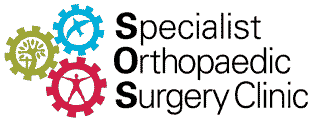Rotator Cuff Tear
What Is a Rotator Cuff Tear?
The rotator cuff is a group of muscles and tendons that hold your shoulder in place and help you lift and rotate your arm. A rotator cuff tear happens when one or more of these tendons become damaged or torn, causing pain, weakness, and limited movement.
Symptoms of a Rotator Cuff Tear
- Pain in the shoulder, especially when lifting or reaching
- Weakness in the arm or difficulty lifting items
- Pain when sleeping on the affected shoulder
- Crackling or clicking sounds with shoulder movement
- Limited range of motion
What Causes Rotator Cuff Tears?
Rotator cuff tears can occur suddenly or develop gradually over time.
Common Causes Include:
- Injury from a fall or lifting something heavy
- Repetitive shoulder use in sports or work
- Wear and tear due to aging (especially over age 40)
- Bone spurs rubbing against the tendons
How Is It Diagnosed?
Your doctor will examine your shoulder and ask about your symptoms. You may be asked to perform certain movements to check for strength and flexibility. Imaging tests may be recommended, including:
- Ultrasound: To visualise the soft tissues
- MRI: Provides a detailed view of tears or tendon damage
- X-rays: May show bone changes or arthritis
Treatment Options
Non-Surgical Treatment
Many patients recover well with non-surgical options, especially for partial tears:
- Rest and avoiding aggravating activities
- Anti-inflammatory medications (e.g., ibuprofen)
- Physiotherapy to strengthen shoulder muscles
- Cortisone injections for pain relief (if needed)
Surgical Treatment
If your tear is large or symptoms persist despite therapy, surgery may be recommended. Most rotator cuff surgeries are done with minimally invasive techniques (arthroscopy).
- Reattaching torn tendons to the bone
- Removing bone spurs (if present)
- Cleaning up frayed tissue
Recovery and Rehabilitation
Recovery depends on the severity of the tear and the treatment used:
- Non-surgical recovery: 6–12 weeks with physiotherapy
- Surgical recovery: 3–6 months, including sling use and rehab
Physiotherapy plays a key role in regaining motion and strength. Full recovery requires patience and adherence to rehab exercises.
When to See a Doctor
See your doctor if you experience:
- Shoulder pain that doesn’t go away
- Weakness or loss of function in the arm
- Trouble sleeping due to shoulder discomfort
Preventing Rotator Cuff Injuries
- Warm up before exercise or sport
- Strengthen shoulder muscles through regular exercises
- Avoid repetitive overhead movements
- Use proper lifting techniques
Helpful Resources
